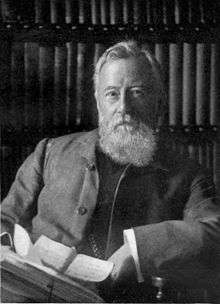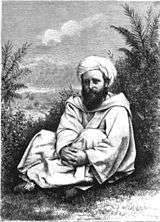Robert Spence Watson
Robert Spence Watson (8 June 1837 – 2 March 1911) was an English solicitor, reformer, politician and writer. He became famous for pioneering labour arbitrations.[1]

Life and career
He was born in Gateshead, the second child of Sarah (Spence) and Joseph Watson.[2] After some early tutoring, he received his secondary education at Bootham School, York and began studying at University College, London in 1853; he did not complete his degree there, but during that time, and later, he travelled abroad.[1]
He returned to the North East in 1860 and was admitted to the bar. He began a legal practice with his father under the name J. & R S Watson and he remained in practice there for the rest of his life.[1]
In 1862 he became Secretary to the Literary and Philosophical Society of Newcastle upon Tyne and held that position for thirty-one years. His work led to the Society accumulating the largest independent library outside London.[1]
On 9 June 1863 he married Elizabeth Richardson at the Friends’ meeting house, Pilgrim Street, Newcastle and they had six children.[1]
He was one of the original convenors of the National Liberal Federation in 1877, and was its president from 1890 until 1902.
He helped to found the Durham College of Science in 1871, later to become Armstrong College and part of Newcastle University. He became its first president in 1910. He was instrumental in the founding of the Newcastle Free Public Library.[1]
From 1890 till 1911, Watson was the president of the Society of Friends of Russian Freedom. He contributed much to the society's printed organ Free Russia.[3]
He published "The History of English Rule and Policy in South Africa" in 1897, and joined the South Africa Conciliation Committee.[4]
In 1995 a blue commemorative plaque was erected outside his home.[5]
Works

- "A Plan for Making the society more extensively useful, as an educational institution" (1868)
- The Villages around Metz (1870)[6]
- Cædmon, the first English poet (1875)[7]
- "The history of English rule and policy in South Africa" (1879) J. Forster, Newcastle upon Tyne.[8]
- A Visit to Wazan (1880)[9]
- "The Proper Limits of Obedience to the Law" (1887)[10]
- The History of the Literary and Philosophical Society of Newcastle-upon-Tyne (1793-1896) (1897)[11]
- "Northumbrian Story and Song" in Lectures Delivered to the Literary and Philosophical Society, Newcastle-upon-Tyne, on Northumbrian History, Literature, and Art (1898)[12]
- The National Liberal Federation: From Its Commencement to the General Election of 1906 (1907)[13]
- Joseph Skipsey: His Life and Work (1909) T. Fisher Unwin, London.
References
- Watson Burton LLP, law firm
- http://www.philanthropynortheast.com/the-philanthropists/watson-robert-spence
- Free Russia; The Organ of the English Society of Friends of Russian Freedom, Volumes 11-15 (1900–1904) (Google eBook)
- Howe, Anthony; Morgan, Simon (2006). Rethinking nineteenth-century liberalism: Richard Cobden bicentenary essays. Ashgate. p. 239. ISBN 0-7546-5572-5. Retrieved 21 July 2011.
- Gateshead commemoration plaques Archived 26 July 2013 at the Wayback Machine
- Robert Spence Watson (1870) The Villages around Metz, J.M. Carr, Newcastle-Upon-Tyne
- Robert Spence Watson (1875) Cædmon, the first English poet, Longmans, Green and Company, London
- "The history of English rule and policy in South Africa": a lecture delivered in the lecture room, Nelson Street, Newcastle-upon-Tyne, on Friday, 30 May 1879 in libraries (WorldCat catalog)
- Robert Spence Watson (1880) A Visit to Wazan: The Sacred City of Morocco, Macmillan and Company, London
- Robert Spence Watson (1887) The Proper Limits of Obedience to the Law, Howe Brothers, Gateshead-On-Tyne
- Robert Spence Watson (1897) The History of the Literary and Philosophical Society of Newcastle-upon-Tyne (1793-1896), Walter Scott, Ltd, London
- Lectures (1898)
- Robert Spence Watson (1907) The National Liberal Federation: From Its Commencement to the General Election of 1906, T. Fisher Unwin, London
Sources
- Percy Corder (1914) The Life of Robert Spence Watson, Headley Bros., London
- John Morley, Joseph Cowen and Robert Spence Watson. Liberal Divisions in Newcastle Politics, 1873 - 1895, by E I Waitt, Thesis submitted for the degree of PhD at the University of Manchester, October 1972. Copies at Manchester University, Newcastle Central and Gateshead public libraries.
- Entry on Robert Spence Watson, on Ben Beck's website
- Entry on Robert Spence Watson, on the website of Watson Burton, the law firm of which he was a founding partner
| Party political offices | ||
|---|---|---|
| Preceded by James Kitson |
President of the National Liberal Federation 1890–1902 |
Succeeded by Augustine Birrell |